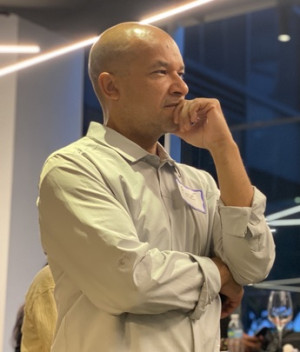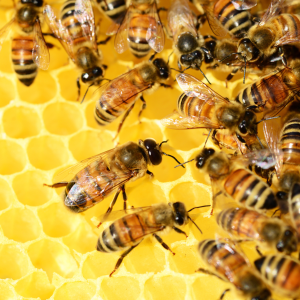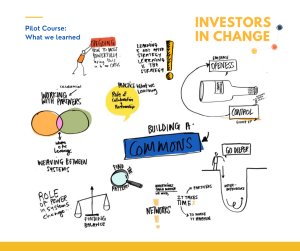In 2021 I (Mairi Lowe) completed the School of System Change Basecamp programme. I was delighted to speak with the School team to share how the course shifted my mindset to help me embrace complexity and move through self-doubt and overwhelm, plus how I put this mindset shift into practice through my Creative Director role at nonprofit Sustainable Fashion Scotland.
Tell us about your background.
I am a Scottish Content Marketer, Systems Practitioner and MSc Social Innovation graduate based in Edinburgh. Focusing on sustainable fashion in Scotland, my research involves navigating complex challenges through a systems change perspective. I apply my systems learnings in practice as the Creative Director of Sustainable Fashion Scotland (SFS). Launched in February 2020, SFS is a community-led social venture exploring through research and practice how communities can contribute to collective impact and collaborate to create place-based sustainable transformations.
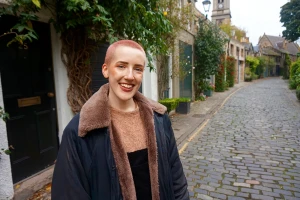
Where did your learning journey with systems change begin, and what brought you to Basecamp?
My systems learning journey began during the initial reading stage of my MSc Social Innovation dissertation around April 2020. I wanted to conduct research that had real-world impact, and so was focusing on how I could apply theory to nurture the growth of Sustainable Fashion Scotland which had officially emerged in February 2020. The concepts of ‘systems thinking’ and ‘systems change’ kept cropping up (this is where I came across the School of System Change) and intrigued me to delve deeper into how systems theory can be applied to effect long-lasting and truly transformative social change.
Before this piece of research I had only heard of ‘system change’ on banners at climate rallies, stating ‘system change NOT climate change’. Although I was new to the theory, the system ‘lens’ made a lot of sense in my head and helped rekindle my hope for the future of fashion. My dissertation ended up evaluating what the role of SFS could look like as a facilitator of change in Scotland’s fashion community. From this I recommended 5 guiding principles for organisations looking to facilitate collective community action (underpinned by an equity lens), which we use today at SFS to guide our agile actions. During the research project I stumbled across Forum for the Future and the School of System Change, attended a Basecamp information session in late June, applied to the course, submitted my dissertation in August (3 minutes before the deadline), and started Basecamp in September to continue to build my systems knowledge and practice!
How did the School of System Change influence the next steps of your systems learning journey? How did Basecamp impact how you work?
Working for a nonprofit and one in climate justice, it is extremely difficult to take a break. There is always something more that could be done and it’s incredibly hard to clock off fully at 5pm as we are all so passionate about our cause and movement. Basecamp gave me permission to take dedicated space and time to pause, think creatively, reflect, connect with and learn from other inspiring changemakers and ideas that nurtured my thinking and practice greatly. I now purposefully dedicate time to iteratively zoom out and reflect on the bigger picture (or system) of which our change work is a part of. This has been a huge shift from my ‘always doing, never reflecting’ way of being.
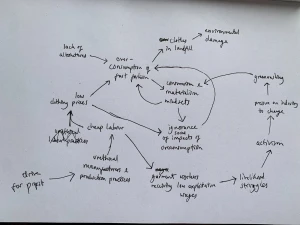
This shift has also influenced our emergent strategy at SFS. Although my Master’s dissertation investigated the most effective role for SFS to adopt (a facilitator of change), we know this is constantly evolving as we grow and adapt to the changing system we are working within. I had been struggling a lot with self-doubt (and still do occasionally) when I began Basecamp as working with an emergent approach can feel unanchoring at points. I often worried if we were doing the ‘right’ thing at SFS, and was concerned that we were not yet able to understand or see our impact (I now know this is an ongoing agile learning process).
From anxiety to curiosity, and uncertainty to possibility
Through both learning from the brilliant Contributors and having more vulnerable conversations with the other participants about our similar struggles of swimming in the vast sea of systems change, I had a realisation that there is no ‘right’ answer or solution when navigating complex sustainability challenges. Basecamp gave me the confidence to embrace complexity, to shift my feelings of paralysing anxiety around uncertainty into hopeful curiosity about the possibilities. This realisation and being surrounded by such kind people (even online) led me to burst into tears at the end of the first intensive week after releasing the pressure I had placed on myself of feeling it was our responsibility to solve climate change through our one organisation.
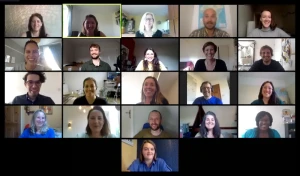
Playing your role as part of a whole
“No one’s life mission is to solve climate change,” Sally Uren (Chief Executive at Forum for the Future) assured us near the end of the course. I bring this phrase to the forefront of my mind whenever the waves of self-doubt and overwhelm begin to swell. SFS is one local organisation that is part of a global movement for change within fashion. SFS makes space for a network — in fact a community — of determined changemakers across Scotland (and beyond) to connect and accelerate collective action for systemic impact and transformative change. We are nothing without our communities. A seed that was planted during Basecamp (particularly during the session by Orit Gal on Social Acupuncture theory) is now woven throughout my systems practice: the knowledge that movements are made up of many people, and that change is catalysed by many interventions at different levels. Community is at the root of SFS — we exist to enable the capacity of many local people acting both individually and collectively at different levels as part of the global sustainable fashion movement.
Basecamp reassured me that everybody’s actions are already creating the system change we are fighting for, and that the indirect impact SFS has as a facilitator and a connector is one crucial part of the collective movement for change. We do not have all the answers at SFS (and that’s okay!) but we can continue to act with hope knowing that the answers and solutions exist within the synergistic relationships of our inspiring community. I know now it’s okay if I personally need to take a break, because the community is still moving, connecting, learning, acting, reflecting, changing; and our collective fire of resistance cannot be snuffed out as long as we connect holistically and collaborate intentionally.
What practical advice do you have for other people who are just beginning their systems journeys, or for those who are feeling overwhelmed working with systemic approaches?
There are five key lessons I nurtured through Basecamp which I still hold during my systems practice:
- There is no one ‘right’ method: don’t worry about doing it perfectly, just do it. There are no experts in such complexity; you just need to practice, experiment, and learn through doing.
- Nobody transforms systems on their own: remember that you are not alone. We need to connect holistically and collaborate intentionally to create systemic change together.
- Focus on your reality and strengths: rather than worrying about what you are not doing and what you can’t do in your current situation, embrace what you are doing and what you are able to do in your unique role.
- Let go of linear control, and flow: create space for new energies to blossom and learnings to emerge, be open to change and agile enough to adapt.
- Most importantly — make time for joy: celebrate how far you have come, the experiences you have had, and the people you have met and helped as you continue to learn and grow.
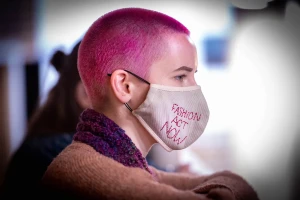
Finally, what are you working on now and is there anything else you want to share about your experience?
At Sustainable Fashion Scotland we are coming up to our second year of existence so are taking time to reflect on our progress and learnings so far, looking back at what has worked well and what hasn’t, and looking forward to explore what possibilities we can tap into in 2022 as we continue to evolve. We are wrapping up some findings from our funded participatory action research project about opportunities for collective action in Scotland, and we are also planning a UK travelling tour for our COP26 Blue Zone exhibit — Generation of Waste — to continue to raise awareness and educate policymakers and the public about the impact of fashion’s textile waste on the environment and people. If you would like to get involved with the tour of the Generation of Waste exhibit, or know of any relevant funding or sponsorship opportunities, please get in touch with me on LinkedIn or email [email protected]. I am looking forward to having a much-needed break over the holidays to fully process and reflect on this year — and to celebrate everything we have achieved!
Being one of the youngest on Basecamp and having only started exploring systems theory, I very much felt like a beginner when I joined the course, but soon realised the community of systems changemakers is where I belong. My advice to anybody considering the course or looking to learn more about systems is to explore Forum and the School’s content, and to get in touch with somebody from the School or attend one of the online information sessions to find out more. Everybody on the course is a learner — even the facilitators and contributors; I am incredibly grateful for the mindset shifts and practical lessons I gained from the 6 months, and am excited to continue to apply to them to my work, and to never stop learning!



